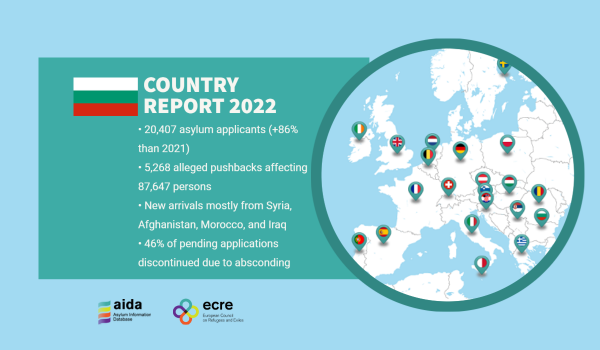The updated AIDA Country Report on Bulgaria provides a detailed overview on legislative and practice-related developments in asylum procedures, reception conditions, detention of asylum seekers and content of international protection in 2022. It also includes an annex which provides an overview of temporary protection (TP).
In 2022, Bulgaria adopted very different approaches to granting access to the territory for persons seeking asylum and protection. While the positive response to displacement from Ukraine resulted in a total of 997,344 Ukrainians that gained access to the territory of Bulgaria by the end of the year, and 149,268 registered as temporary protection holders, the use of pushbacks practices registered through the national monitoring mechanism increased dramatically at the country’s southern borders. It was estimated that 5,268 pushbacks were carried out, affecting a total of 87,647 individuals. At the same time, Bulgaria remained a transit country, from which many tried to reach other destinations in Europe. Despite these factors, the number of asylum applicants in the country significantly increased, going from 10,999 in 2021 to 20,407 in 2022.
The number of asylum seekers who were considered as having abandoned the procedure due to absconding increased compared to 2021, and represented 46% of pending cases in 2022 (14,474 out of 31,592). The main reasons for this might be found in the significant length of the procedures, low recognition rates for certain nationalities, as well as poor reception conditions. In the second half of 2022, however, several improvements regarding the length, as well as the standards and quality of the asylum procedure were observed, which positively affected recognition rates. In 2022, the overall recognition rate increased to 91% of all decisions on the merits, with 89% being recognised subsidiary protection and 2% refugee status. This increase was also due to the fact that, for the first time in a decade, Afghan applicants enjoyed a 49% recognition rate.
The conditions in the vast majority of the reception centers remain overwhelmingly substandard due to inadequate infrastructures, limited hygiene and basic services as well as an important lack of safety. For many years, the State Agency for Refugees (SAR) reported that the maximum capacity of its reception centres was of 5,160 places. In December 2022, however, the new SAR management indicated that the actual reception capacity was of 3,932 individuals. The remaining 1,228 places were assessed as unfit for living. Moreover, due to an incorrect forecast of new arrivals, SAR did not destine sufficient budget for refurbishment, food and medical support in reception centres. As in the previous year, many unaccompanied children were accommodated in mixed premises with adults, without proper support and guaranteed personal safety.
As regards integration, there are no activities planned, funded nor made available to beneficiaries of international protection, and only a few benefit from integration support. 2022 thus marks the ninth consecutive year of the national “zero integration” policy. The national asylum authority further continued to cease or revoke international protection on the basis of a new provision introduced in 2020 which contradicts the Refugee Convention and the recast Qualification Directive. The undue cessation of international protection has affected 4,405 status holders in total since then. А positive change was however achieved regarding care and accommodation of unaccompanied children, seeking or granted international protection. The asylum authority, SAR, began to actively search for opportunities to accommodate unaccompanied children in licensed family-type children’s centres (ЦНСТ); throughout the year, it accommodated a total of 26 unaccompanied children in specialized centres.
The full report is available here, and the temporary protection annex to the report is available here.
For more information about the AIDA database or to read other AIDA reports, please visit the AIDA website.

